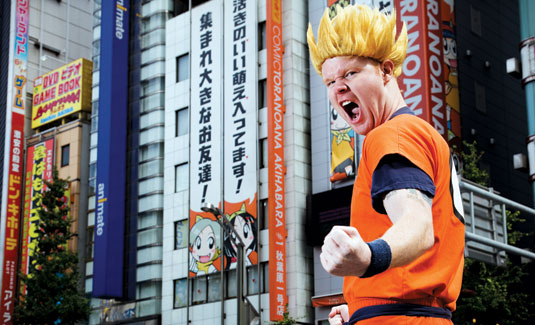New TUJ summer program gives students inside view
 |
|
| Costumed in Dragon Ball Z roleplay regalia, cultural anthropologist Patrick W. Galbraith leads a tour of Tokyo's Akihabara neighborhood, an electronics and anime hotspot. Galbraith is one of several leading scholars who will teach at Temple University Japan's Summer Institute, a new 10-week program focusing on Japan's pop culture as a force of global social innovation. |
|
|
Japan is a world power again. But this time around, the source of its influence isn’t political The Institute of Contemporary Asian Studies at Temple University’s Japan Campus (TUJ) in Tokyo has announced the launch of the Summer Institute in Studies in Japanese Popular Culture, a new 10-week, immersive academic program designed to develop a systematic and focused study of Japan’s pop culture as a force of global social innovation. “We’ve seen a growing interest in Japanese culture here at TUJ,” said sociologist Kyle An authority on Japanese youth and popular culture, ethnic identity and visual media studies, Cleveland is one of several leading scholars who will teach at the Summer Institute. He will be joined by Roland Kelts, the renowned half-Japanese author of Japanamerica: How Japanese Pop Culture Courses in the Summer Institute’s special curriculum include “Anime in Japanese Popular Culture,” “Manga in Japanese Popular Culture,” “Youth and Popular Culture” and “Problems in Sociocultural Anthropology.” Students enroll in three of the courses offered, for a total of nine or ten credits. Students also have the option of studying Japanese language. Courses are taught in English; Japanese Institute classes will include field trips to art and anime exhibitions, clubs, concerts and other trips and TUJ is the oldest and largest foreign university in Japan. Founded in 1982, it has developed into an internationally recognized institution offering an extensive range of educational programs. In addition to its core undergraduate program, TUJ offers graduate programs in law, business, and education; an English-language preparation program; continuing education courses; and corporate education classes. Students come from over 60 countries around the world. The deadline to apply for the Summer Institute is Feb. 22. The summer program runs from May 19 to July 31. For more information, including application procedures, go to www. |
|